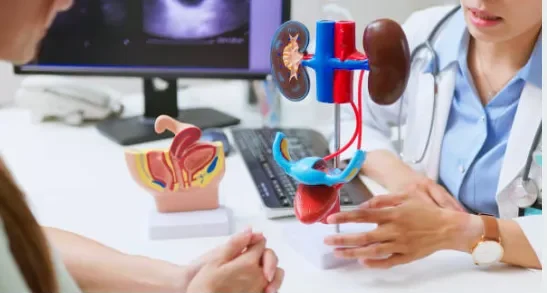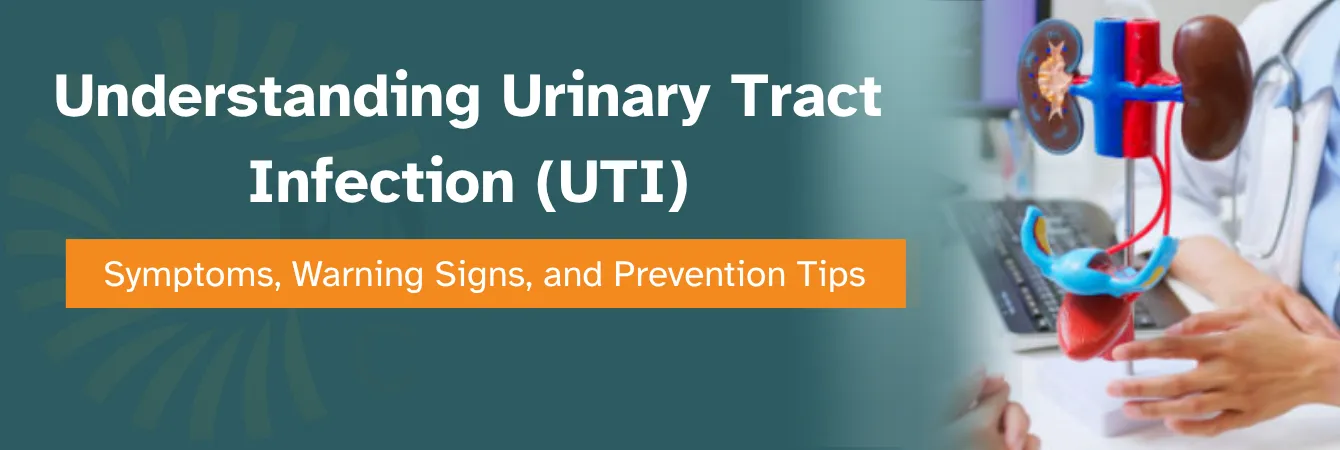What You Need to Know About Urinary Tract Infections (UTIs): Signs, Causes, and How to Prevent Them
- July 17, 2025
- Abrol Hospital
Introduction: What Is a UTI and Why Should You Care?
A Urinary Tract Infection (UTI) is one of the most common infections that affect the human urinary system, which includes the urethra, bladder, ureters, and kidneys. While both men and women can develop UTIs, women are more likely to suffer due to anatomical differences such as a shorter urethra, which allows bacteria quicker access to the bladder. UTIs are not only uncomfortable but also potentially dangerous if not treated in time. If the infection ascends from the bladder to the kidneys, it can cause serious health complications, including permanent kidney damage or sepsis.
What Causes a Urinary Tract Infection?
Bacterial Invasion through the Urethra:
The most common cause of a UTI is the invasion of bacteria, especially Escherichia coli (E. coli), which is normally found in the gastrointestinal tract. When these bacteria enter the urethra and begin to multiply in the bladder, they can cause an infection. In many cases, the bacteria spread from the anus to the urethral opening due to poor hygiene practices or other lifestyle factors.
Poor Hygiene Practices
Improper cleaning habits, such as wiping from back to front after using the toilet, can transfer bacteria from the rectal area to the urethra. This is especially problematic for women, whose urethral opening is closer to the anus. Inadequate cleaning after sexual activity or using unclean public restrooms also increases the risk.
Holding Urine for Long Periods
Delaying urination for extended periods allows bacteria more time to multiply within the bladder. This retained urine becomes a breeding ground for harmful microbes, leading to infection. Habitually holding in urine also weakens bladder muscles over time, further exacerbating the problem.
Dehydration and Infrequent Urination
When fluid intake is low, urine becomes concentrated and less frequent, reducing the flushing effect that usually removes bacteria from the urinary tract. A lack of hydration is one of the most overlooked causes of recurring UTIs, especially in elderly individuals and office workers who avoid regular water intake.
Sexual Activity
During sexual intercourse, bacteria around the genital area can be pushed into the urethra. Women are particularly at risk, and those who are sexually active are advised to urinate both before and after intercourse. Certain sexual positions or practices may also contribute to the transfer of bacteria.
Use of Contraceptives
Some contraceptive methods, like diaphragms and spermicides, can alter the natural flora of the vagina or apply pressure to the urethra, making infections more likely. These methods can change the pH balance, disrupt protective barriers, and increase the chances of bacterial overgrowth.
Urinary Tract Blockages
Obstructions such as kidney stones, enlarged prostate glands, or tumors can prevent complete emptying of the bladder. Residual urine left behind creates an ideal environment for bacterial growth and increases the risk of infections.
Underlying Medical Conditions
People with conditions such as diabetes, spinal cord injuries, or multiple sclerosis are at higher risk of UTIs due to impaired immune function or difficulty in fully emptying the bladder. Diabetics, in particular, may also have sugar in their urine, which encourages bacterial multiplication.
Common Signs and Symptoms of a UTI
Burning or Pain During Urination
A sharp, burning sensation while urinating is one of the first and most noticeable signs of a UTI. The inflammation caused by bacteria irritates the lining of the urethra, making urination uncomfortable and sometimes painful.
Frequent and Urgent Urge to Urinate
UTIs often trigger an urgent and persistent need to urinate, even when the bladder is not full. This urgency can be especially inconvenient at night, disrupting sleep and daily routines. It may also be accompanied by an inability to fully empty the bladder.
Passing Small Amounts of Urine
Despite the constant urge to urinate, many patients can only pass small quantities. This happens because bladder inflammation prevents normal function, and the sensation of fullness is often caused by irritation rather than actual urine volume.
Foul-Smelling or Cloudy Urine
Bacterial waste products, white blood cells, and dead epithelial cells can change the appearance and smell of urine. Patients often report urine that is darker than usual, cloudy, and with a strong, unpleasant odor, which is a clear sign of infection.
Blood in the Urine (Hematuria)
Visible blood or pinkish color in urine is an alarming symptom. Hematuria occurs due to irritation and damage to the bladder or urethra lining caused by infection. Although not always present, it is a critical indicator and should never be ignored.
Lower Abdominal or Pelvic Pain
Pain or cramping in the lower abdomen, particularly around the bladder area, is a common complaint. This discomfort results from inflammation and pressure within the urinary tract and may worsen with movement or during urination.
Fever and Chills
If the infection progresses to the kidneys, fever and chills often follow. These symptoms indicate a systemic response to the infection and require immediate medical attention. Kidney infections can quickly become life-threatening if left untreated.
Who’s More Likely to Get a Urinary Tract Infection (UTI)?
🔹 Women
Women are significantly more likely to get UTIs compared to men, and this mainly comes down to anatomy. A woman’s urethra is shorter than a man’s, which means bacteria have a much shorter distance to travel before reaching the bladder. Additionally, because the urethra is located closer to the anus in women, there’s a greater chance for bacteria like E. coli (commonly found in the intestines) to enter the urinary tract. This is why UTIs are especially common in sexually active women or those who don’t urinate soon after intercourse.
🔹 Pregnant Women
Pregnancy increases the risk of UTIs due to both hormonal and physical changes in the body. Hormones like progesterone relax the muscles in the urinary tract, slowing the flow of urine and making it easier for bacteria to multiply. Meanwhile, as the baby grows, the uterus puts pressure on the bladder, reducing its capacity and making it harder to empty completely. Urine that stays in the bladder for longer periods creates an ideal environment for bacteria to thrive, making UTIs more likely during pregnancy. That’s why regular urine tests during prenatal checkups are important.
🔹 Older Adults
Older adults, especially those over the age of 65, are more vulnerable to UTIs for several reasons. First, their immune systems may not be as strong, which makes it harder to fight off infections. Second, they may have other health conditions — like incontinence or dementia — that increase the risk. Older adults might not experience the typical symptoms like burning while urinating or frequent urges. Instead, they might just feel generally unwell, confused, weak, or unusually tired. Because these signs can be subtle, UTIs in seniors are often missed or diagnosed late.
🔹 People with Diabetes
Individuals with diabetes have a higher risk of developing UTIs. High blood sugar levels can weaken the immune system, making it less effective at fighting off infections. Moreover, sugar in the urine acts as food for bacteria, helping them grow faster. People with poorly managed diabetes may also have issues with bladder function, which can cause incomplete emptying of urine — a key risk factor for bacterial buildup. That’s why maintaining good blood sugar control and regular checkups are essential for preventing UTIs in diabetic patients.
🔹 People Who Use Catheters
Catheters — thin tubes used to help drain urine from the bladder — can be a lifesaver for people with certain health conditions, but they come with a downside. If not inserted or maintained properly, catheters can allow bacteria to enter directly into the bladder. Even long-term use of a clean catheter increases the risk of developing what’s known as a catheter-associated urinary tract infection (CAUTI). This is why hospitals and caregivers follow strict hygiene protocols when dealing with catheters and aim to remove them as soon as they’re no longer needed.
🔹 Men with Enlarged Prostates
Men with benign prostatic hyperplasia (BPH), or an enlarged prostate, often have difficulty emptying their bladder fully. When urine stays behind in the bladder, it provides a breeding ground for bacteria. Over time, this buildup can lead to frequent or chronic UTIs. Men with BPH may also experience symptoms like weak urine flow, straining to urinate, or feeling like the bladder isn’t fully empty — which further increases the chance of infection.
What Really Happens If You Don’t Treat a UTI?
Ignoring a urinary tract infection (UTI) might seem harmless at first—especially if symptoms are mild—but leaving it untreated can lead to serious and even life-threatening complications. Here’s what could happen if you don’t take it seriously:
🔹 Kidney Infection (Pyelonephritis)
When bacteria from the bladder are not eliminated, they can travel up the ureters and reach the kidneys. This can cause a kidney infection, which is much more severe than a simple UTI. Kidney infections can bring symptoms like high fever, back or side pain, chills, nausea, and vomiting. If not treated promptly, the infection can permanently damage your kidneys. Most cases need strong antibiotics and sometimes hospitalization to receive fluids and medications through an IV.
🔹 Sepsis – A Life-Threatening Emergency
In rare and severe cases, the infection may escape the urinary system and enter your bloodstream. This condition is known as sepsis and it’s considered a medical emergency. Sepsis can cause your body to go into shock, potentially shutting down vital organs like the heart, lungs, and kidneys. This is especially dangerous for older adults or people with weakened immune systems. Without rapid treatment, sepsis can be fatal.
🔹 Pregnancy Complications
Pregnant women are more vulnerable to UTIs due to hormonal changes and physical pressure on the bladder. If a UTI is not treated during pregnancy, it can lead to serious problems such as premature birth, low birth weight in babies, and pregnancy-induced high blood pressure (preeclampsia). That’s why doctors regularly check for UTIs during prenatal visits. Expecting mothers should never ignore symptoms like burning during urination, increased urgency, or lower abdominal pain.
🔹 Recurrent Infections and Long-Term Damage
Ignoring or poorly treating UTIs can lead to recurring infections that become harder to treat. Over time, this can cause permanent damage to the urinary tract, such as scarring in the bladder or urethra. Some people may develop chronic bladder pain or urinary incontinence, affecting their quality of life. In very serious cases, surgery may be required to correct structural damage caused by ongoing infections.
How to Prevent UTIs – Simple Habits That Actually Work
🔹Drink Plenty of Water
Water is your best defense against UTIs. It helps flush out bacteria from the urinary tract before they can cause an infection. Aim to drink at least 8 to 10 glasses of water a day, unless your doctor advises otherwise. If you’re prone to UTIs, keeping your urine diluted and frequent can make a big difference.
🔹 Don’t Hold Your Pee
It may seem harmless to delay a bathroom trip, especially when you’re busy—but holding in urine gives bacteria extra time to multiply in your bladder. This increases the risk of infection. Make it a habit to go to the restroom as soon as you feel the urge to pee. This simple action helps reduce bacterial growth.
🔹Always Wipe Front to Back
After using the toilet, especially for women, always wipe from front to back. This prevents bacteria from the rectal area (like E. coli) from getting near the urethra and entering the urinary tract. It’s a small hygiene step with a big impact on prevention.
🔹 Pee Right After Sexual Activity
Sexual activity can introduce bacteria into the urethra, especially for women. By urinating right after sex, you flush out any bacteria that may have entered. It’s a simple and effective step to reduce your chances of getting a post-sex UTI.
🔹 Stay Away from Harsh Soaps and Feminine Sprays
Using perfumed or harsh cleaning products in your intimate area can disturb the natural pH balance, making it easier for harmful bacteria to thrive. Avoid products like scented soaps, powders, or sprays on or near your genitals. Stick to gentle, unscented cleansers if needed, and avoid douching altogether.
🔹 Wear Cotton Underwear and Loose Clothing
Tight clothes or underwear made from synthetic fabrics trap moisture and heat, which creates the perfect environment for bacteria. Choose cotton underwear and loose-fitting pants or skirts when possible. This helps keep the area dry and allows your skin to breathe.
Don’t Wait – Consult Our Urology Expert Today!
UTIs can start off as a minor inconvenience but quickly turn into something more serious if left untreated. Whether you’re dealing with burning sensations, frequent urination, pelvic discomfort, or just feel that something isn’t right — you don’t have to suffer in silence. Our expert Urologists and Nephrologists specialize in diagnosing and treating urinary infections with advanced care and personalized attention. Book your consultation today!

FAQs About Kidney Stones Symptoms
Most UTIs begin with symptoms like a burning sensation while urinating, frequent urges to urinate even with little output, cloudy or smelly urine, and lower abdominal discomfort. Some people may also feel fatigued or feverish. Early diagnosis helps prevent the infection from spreading to the kidneys.
Yes, but it’s very important to use only doctor-prescribed antibiotics that are safe during pregnancy. Untreated UTIs in pregnancy can lead to complications like premature labor or kidney infections. Pregnant women should have regular urine tests to catch infections early.
Recurrent UTIs can result from incomplete bladder emptying, underlying health conditions like diabetes, anatomical differences, or even poor hygiene habits. Your doctor may suggest preventive antibiotics or additional testing to address the root cause.
In very mild cases, some UTIs might resolve without antibiotics, especially in young, healthy individuals. However, most cases require proper medical treatment to avoid complications. It’s always best to consult a doctor to assess the severity and need for antibiotics.
A simple urine test (urinalysis) can detect signs of infection such as bacteria, white blood cells, or red blood cells in your urine. In some cases, a urine culture may be needed to identify the specific bacteria causing the infection.
Doctors often prescribe antibiotics such as nitrofurantoin, trimethoprim-sulfamethoxazole, or fosfomycin. However, the choice of antibiotic depends on the bacteria strain, your medical history, and potential resistance patterns. Always complete the full course of medication even if symptoms improve.



